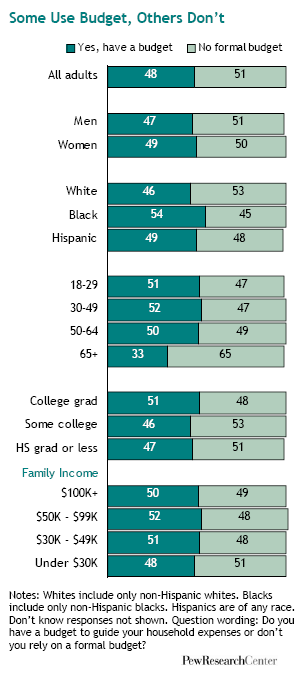About half (51%) of all adults surveyed say they don’t rely on a formal budget to guide household expenses. There are no significant differences between men and women; or among income groups. And, there are only modest differences by education and along racial and ethnic lines.

There is some variance in the use of a budget by age. Adults on the younger side (ages 18-64) are more likely than those ages 65 and older to rely on a budget.
Significant differences surface by marital status. Married people are more likely to rely on a budget (51%) than are the unmarried (44%). Parents of minor age children (54%) are more likely than non-parents and those with adult age children (44% each) to say they use a budget to guide household expenses.
Employment status is also important. Workers are more likely than retirees or non-retirees who are not employed to rely on a budget.
More than half (55%) of those who have had a debt problem (those who have used a credit consolidator or declared bankruptcy in the past) say they rely on a formal budget. Similarly, those with credit card debt that exceeds their ability to pay in full each month are a bit more likely to have a budget for household expenses.
Those who use a budget are more likely than those who don’t to regularly review their household expenses.
Among the former group, nearly two-thirds (64%) say they review their expense at least once a month to see how well they are doing or to make changes in their spending habits; among those in the latter group, just 40% say they engage in this sort of monthly review.




